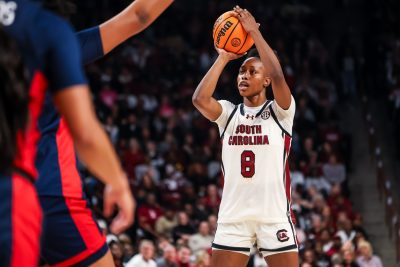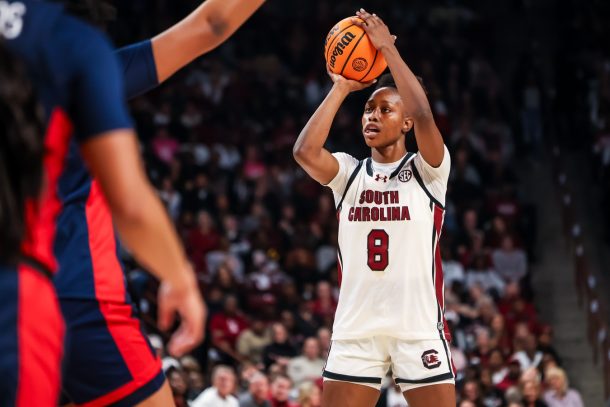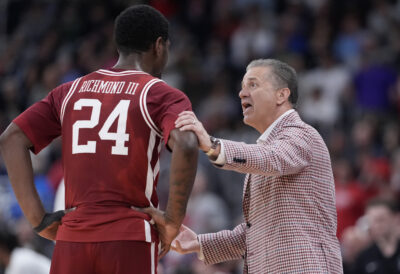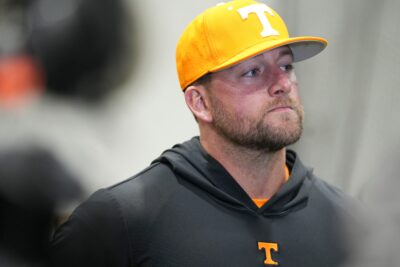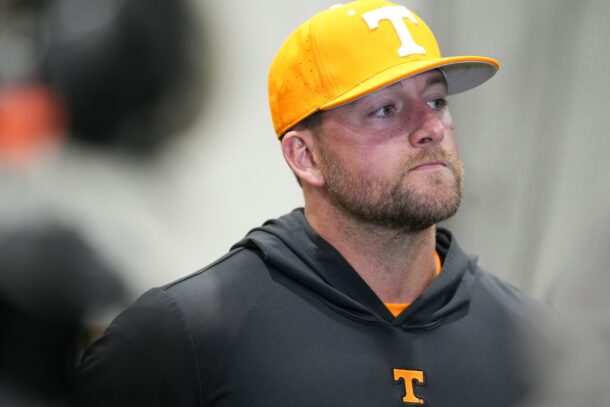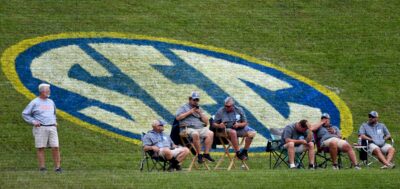Kentucky Basketball History: NCAA Tournament Champions, Best Players and Coaches
By Chris Wright
Last Updated:
Kentucky is the bluest of college basketball’s exclusive blue-bloods.
The Wildcats have owned SEC basketball for decades and are second all-time with eight NCAA Tournament titles. Only UCLA (11) has won more.
Kentucky’s basketball history also includes Naismith Hall of Fame coaches and players. Two Kentucky players are Wooden Award winners and Naismith Award winners.
Let’s take a deeper look at Kentucky’s storied basketball history.
How Many Times Has Kentucky Won The NCAA Tournament?
The Wildcats enter the 2025 NCAA Tournament having having won eight titles (2012, 1998, 1996, 1978, 1958, 1951, 1949, 1948). They also have finished runner-up four times, most recently in 2014, when they lost to UConn 60-54 in the championship game.
How Many Times Has Kentucky Been to The Final Four?
Entering the 2025 March Madness, Kentucky has been to the Final Four 17 times. Only North Carolina (21) has been to the Final Four more times.
Kentucky’s most recent trip to the Final Four came in 2015. The Wildcats were 38-0 heading into their Final Four semifinal clash with Wisconsin but lost 71-64, ending their bid at a perfect season.
How Many Times Has Kentucky Won The SEC Tournament?
Kentucky has won the SEC Tournament 32 times. Nobody else in the SEC has won the tournament more than 8 times.
Kentucky most recently won the SEC Tournament in 2018.
Kentucky’s NCAA Tournament Championship Teams
Here’s a brief look at the eight championship teams and how they conquered March Madness.
2012: 38-2, SEC regular-season champion, NCAA Tournament champion
2012 NCAA Tournament path: The Wildcats were the No. 1 seed in the South Region.
- First round: defeated No. 16 seed Western Kentucky 81-66
- Second round: defeated No. 8 Iowa State 87-71
- Sweet 16: defeated No. 4 Indiana 102-90
- Elite Eight: defeated No. 3 Baylor 82-70
- Final Four: defeated No. 4 Louisville 69-61
- Championship: defeated No. 2 Kansas 67-59
Season in review: John Calipari’s one-and-done roster rolled to one greatest seasons in college basketball history. Led by Anthony Davis — who won the Wooden Award, Naismith Award and Final Four Most Outstanding Player Award — the Wildcats set a program record for wins in a season. They went undefeated in SEC play before losing in the SEC Tournament championship game to Vanderbilt. Their only other loss was at Indiana in the regular season. Davis and Michael Kidd-Gilchrist were the first 2 picks in the 2012 NBA Draft. Terrence Jones and Marquis Teague also were selected in the first round. In total, 7 Wildcats from this team played in the NBA.
1998: 35-4, SEC regular-season champion, SEC Tournament champion, NCAA Tournament champion
1998 NCAA Tournament path: The Wildcats were the No. 2 seed in the South Region.
- First round: defeated No. 15 seed South Carolina State 82-67
- Second round: defeated No. 10 Saint Louis 88-61
- Sweet 16: defeated No. 6 UCLA 94-68
- Elite Eight: defeated No. 1 Duke 86-84
- Final Four: defeated No. 3 Stanford 86-85
- Championship: defeated No. 3 Utah 78-69
Season in review: Coach Tubby Smith replaced Rick Pitino and immediately added to Kentucky’s championship total. But it wasn’t always a smooth ride. The Wildcats spent the year safely inside the top 10 of the AP poll but never climbed higher than No. 4. Kentucky hit its stride just before March Madness, winning its final four regular-season games, then sweeping through the SEC Tournament and NCAA Tournament. The roster featured six eventual NBA players, led by Final Four Most Outstanding Player Award winner Jeff Sheppard.
1996: 34-2, SEC regular-season champion, NCAA Tournament champion
1996 NCAA Tournament path: The Wildcats were the No. 1 seed in the Midwest Region.
- First round: defeated No. 16 seed San Jose State 110-72
- Second round: defeated No. 9 Virginia Tech 84-60
- Sweet 16: defeated No. 4 Utah 101-70
- Elite Eight: defeated No. 2 Wake Forest 83-63
- Final Four: defeated No. 1 UMass 81-74
- Championship: defeated No. 4 Syracuse 76-67
Season in review: The Wildcats hadn’t won the NCAA Tournament since 1978, and Big Blue Nation was growing restless. With the results, and Rick Pitino, whose Wildcats had been close but not quite good enough to hang another banner.
The 1996 team opened the year ranked No. 1 and stayed at or near the top all season. The roster was loaded with nine players who made it to the NBA. Current Kentucky basketball coach Mark Pope was a team captain, but Tony Delk, Antoine Walker and Walter McCarty were the stars. The Cats lost their second game of the season — to John Calipari’s UMass team — then reeled off 27 consecutive wins until stumbling in the SEC Tournament championship game. They rebounded in March Madness — including a victory over Calipari and UMass in the Final Four — to win their sixth NCAA Tournament title. Delk was named the Final Four MOP.
1978: 30-2, SEC regular-season champion, NCAA Tournament champion
1978 NCAA Tournament path: The 32-team NCAA Tournament had yet to adopt seeding, but the Wildcats were the No. 1 ranked team in the AP Poll.
- First round: defeated Florida State 85-76
- Sweet 16: defeated Miami (Ohio) 91-69
- Elite Eight: defeated Michigan State 52-49
- Final Four: defeated Arkansas 64-59
- Championship: defeated Duke 94-88
Season in review: Joe B. Hall had the unenviable task of replacing the legendary Adolph Rupp, who guided Kentucky to its first four NCAA Tournament titles. Rupp retired after the 1971-72 season with 876 career wins — then the Men’s Division I record.
Hall, a devoted assistant under Rupp, took over and led Kentucky to the 1975 NCAA Tournament championship game. But the Wildcats lost to UCLA, and the title watch continued. The 1978 team was dominant from the opening tip. Ranked No. 1 most of the season, the Wildcats started 14-0. Their only 2 losses were road games at Alabama and LSU. The roster included 3 starters who eventually made it to the NBA. They were perfectly complementary. Jack Givens was a natural scorer. Kyle Macy was a sharpshooter who would have been even more dangerous had there been a 3-point line, and center Rick Robey controlled the middle. Givens scored 41 points in the championship — still the 3rd-most in March Madness title game history — and was named the Final Four MOP as Kentucky ended its championship drought.
1958: 23-6, SEC regular-season champion, NCAA Tournament champion
1958 NCAA Tournament path: There were no seeds in the 24-team NCAA Tournament. Kentucky started in the Sweet 16.
- First round: bye
- Sweet 16: defeated Miami (Ohio) 94-70
- Elite Eight: defeated Notre Dame 89-56
- Final Four: defeated Temple 61-60
- Championship: defeated Seattle 84-62
Season in review: This was Adolph Rupp’s fourth and final NCAA Tournament championship team at Kentucky. And this group limped into March, falling as far as No. 13 in the AP Poll before winning its final 5 games. The Wildcats dominated Seattle in the championship game, but Seattle star Elgin Baylor still was named the Final Four MOP. Vernon Hatton was Kentucky’s star, averaging a team-high 17 points per game. Hatton outscored Baylor 30-25 in the national title game.
1951: 32-2, SEC regular-season champion, SEC Tournament champion, NCAA Tournament champion
1951 NCAA Tournament path: There were no seeds in the 16-team NCAA Tournament, but Kentucky was ranked No. 1 in the AP Poll most of the season.
- Sweet 16: defeated Louisville 79-68
- Elite Eight: defeated St. John’s 59-43
- Final Four: Illinois 76-74
- Championship: defeated Kansas State 68-58
Season in review: Rupp’s juggernaut was in full force in 1950-51, capping the season by winning their third NCAA Tournament title in four years. Five Wildcats went on to play in the NBA, not including Final Four Most Outstanding Player Bill Spivey, who scored a game-high 22 points in the championship game.
1949: 32-2, SEC regular-season champion, SEC Tournament champion, NCAA Tournament champion
1949 NCAA Tournament path: There were only 8 teams in the tournament, meaning everybody started in the “Elite Eight.”
- Elite Eight: defeated Villanova 85-72
- Final Four: defeated Illinois 76-47
- Championship: defeated Oklahoma State 46-36
Season in review: There were only 8 sets of rankings in the AP Poll. Defending champion Kentucky opened the season ranked No. 2 but quickly moved to No. 1, where it stayed the rest of the season. Four senior starters made it to the NBA, led by leading scorer and Final Four Most Outstanding Player Alex Groza, who scored 25 points in the title game. Groza is 1 of 5 players to win the MOP Award at least 2 times. Kentucky became the second team to repeat as NCAA Tournament champion. (Oklahoma State won back-to-back titles in 1945 and 1946.)
1948: 36-3, SEC regular-season champion, SEC Tournament champion, NCAA Tournament champion
1948 NCAA Tournament path: There were only 8 teams in the tournament.
- Elite Eight: defeated Columbia 76-53
- Final Four: defeated Holy Cross 60-52
- Championship: defeated Baylor 58-42
Season in review: Adolph Rupp became Kentucky’s coach in 1930. The NCAA Tournament made its debut in 1939. It took Rupp and the Wildcats until 1948 to hang their first banner. The Cats did so behind Groza, who won the Final Four Most Outstanding Player Award after scoring a game-high 14 points in the title game. The core of this team returned intact to win the 1949 title, too.
Kentucky’s Hall of Fame Coaches
Adolph Rupp
Record at Kentucky: 876-190 (.822)
Notable: Rupp retired with the most wins in college basketball history, and only John Wooden had won more NCAA Tournament titles. He has since moved down both lists, but he remains an iconic name in college basketball history.
Rupp was elected to the Naismith Hall of Fame in 1969.
John Calipari
Record at Kentucky: 410-123 (.769)
Overall record: 875-276 entering the 2025 NCAA Tournament
Notable: Calipari returned Kentucky to the top of the college basketball world with his own, unique style of relying almost exclusively on NBA-ready freshmen. He popularized “one-and-done” and led the Cats to their most recent NCAA Tournament title in 2012. He was inducted into the Naismith Hall of Fame in 2015. He left Kentucky for Arkansas following the 2024 season.
Rick Pitino
Record at Kentucky: 219-50 (.814)
Overall record: 884-310 entering the 2025 NCAA Tournament
Notable: Pitino wasn’t at Kentucky long — just 8 seasons before leaving to try the NBA — but his impact is lasting. He won the 1996 NCAA Tournament title and led the Cats to the Final Four 3 times. It didn’t help that he also had a very successful run at Louisville, where he also won an NCAA Tournament title, but Pitino has recently made amends with BBN, saying he never should have left the Wildcats. He was inducted into the Naismith Hall of Fame in 2013.
Eddie Sutton
Record at Kentucky: 90-40 (.692)
Overall record: 806-329
Notable: Eddie Sutton replaced Joe B. Hall and was fired after 4 mostly nondescript seasons. He guided the Wildcats to the NCAA Tournament 3 times but never got to the Final Four. Sutton was inducted into the Naismith Hall of Fame in 2020 more so because of his success everywhere else.
Are Tubby Smith and Joe B. Hall in The Hall of Fame?
Both coaches won an NCAA Tournament at Kentucky and are in various other Halls of Fame, but neither has yet been inducted into the Naismith Hall of Fame.
Kentucky’s All-Time Starting Five
Caveat: Settling on a consensus starting five at a program with as much history as Kentucky is impossible. You could mix and match between 25 players and form five evenly matched teams. John Calipari changed everything about the program and produced more elite NBA talent in his 15 years than the Wildcats had produced in its history before he arrived. In fact, 34 of Kentucky’s 62 first-round picks in the NBA Draft played for Calipari. Of Kentucky’s 40 players who were selected among the top 14 overall picks, 23 played for Calipari. Obviously, this starting five reflects that level of talent.
Point guard: John Wall
Wall was the No. 2 player in the 2009 recruiting class and the key get of Calipari’s first recruiting class at Kentucky. That class included DeMarcus Cousins and Eric Bledsoe and set in motion how Calipari planned to attack recruiting and college basketball. Wall was as advertised, too. He averaged 16.6 points and 6.5 assists while earning first-team All-America honors. He led Kentucky to a 35-3 record, the SEC regular-season championship and SEC Tournament title. Kentucky lost in the Elite Eight, but the blueprint was formed.
Shooting guard: Kyle Macy
The 3-point line didn’t exist when Macy was consistently knocking down 25-footers, but it’s easy to imagine adding another 3 or 4 points to his 14.4 career average if it did. It’s easier to imagine Wall driving and kicking to Macy for an open 3. Macy was a key piece of Kentucky’s 1978 national championship team and then was a first-team All-American as senior in 1980. He also was a career 51.4% shooter — an absurdly high rate for a shooting guard. (Steph Curry, for instance, shot 46.7% for his career at Davidson.)
Small forward: Jamal Mashburn
Mashburn only played 3 seasons at Kentucky. He twice averaged more than 20 points per game and was named first-team All-American as a junior in 1993. Had he returned, he would have become Kentucky’s all-time leading scorer. As it stands, he still ranks No. 6 with 1,843 points. He was the No. 4 overall pick in the 1993 NBA Draft. In a tight call, Mashburn gets the slight edge over 1978 NCAA Tournament hero Jack Givens, who remains Kentucky’s No. 3 all-time leading scorer with 2,038 points.
Power forward: Dan Issel
Issel remains the greatest scorer in Kentucky basketball history. By any definition. Despite leaving for the NBA after the 1969-70 season, Issel still ranks No. 1 in career points with 2,138 points. He averaged 25.8 points per game, far and away the best in program history. A 2-time All-American, he also had one of the greatest scoring games in NCAA Tournament history, pouring in 44 against Notre Dame in a Sweet 16 victory in 1970.
Center: Anthony Davis
Forget the numbers. Davis was only at Kentucky for 1 season, but it was arguably the most spectacular in program history. The freshman led the Wildcats to the 2012 NCAA Tournament title — still their most recent — and swept every major award in the process. He was named the AP Player of the Year, won the Wooden Award, Naismith Award and was named Final Four Most Outstanding Player. New Orleans selected Davis with the No. 1 overall pick in the 2012 NBA Draft. He made his 10th All-Star team in 2024-25 and is well on his way to one day being enshrined in the Naismith Hall of Fame.
Managing Editor
A 30-time APSE award-winning editor with previous stints at the Miami Herald, The Indianapolis Star and News & Observer, Executive Editor Chris Wright oversees editorial operations for Saturday Down South.

